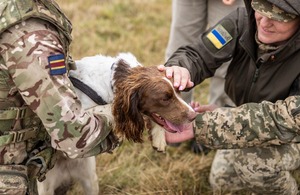British Army trains Ukrainian military dog handlers
UK personnel are training Ukrainian military dog handlers in vital skills from patrols to explosive device searches.

UK military working dog handlers train with their Ukrainian counterparts.
- Specialist training includes combat operations and explosive device searches.
- It is part of Operation Interflex, which has trained more than 45,000 Ukrainian personnel since Russia’s illegal invasion in 2022.
- 16 handlers have been trained by the British Army on two courses this summer.
Ukrainian soldiers and civilians will be better protected from unexploded ordnance and illegal weapons thanks to training offered in the UK to Ukrainian border guards and their working dogs.
This week the UK has welcomed the second group of Ukrainian military dog handlers from the State Border Guard Service of Ukraine to receive specialist training from their British counterparts.
The three week training visit includes how to conduct effective patrols and explosive device searches. UK trainers also demonstrated how UK military working dogs are acclimated to the sights, sounds and smells of the battlefield, allowing them to work safely and efficiently alongside their handlers.
Military working dogs are essential on the front line and on the border as their highly adaptable nature means they can be trained for a range of specialised roles and deployed across multiple military branches to keep personnel safe. In Ukraine, only this year Ukrainian working dogs have been used to prevent 950 border violations, including seizing 87.5kgs of drugs, nearly 20,000 piece of ammunition, 150 mines and 32kgs of explosives.
This collaborative training upholds the UK’s iron-clad commitment to Ukraine’s security and comes just days after the Defence Secretary John Healey announced the extension of Operational Interflex, having already trained over 45,000 Ukrainian recruits the programme will continue until at least the end of 2025.
More than two years into Russia’s full-scale invasion, huge areas of Ukraine are covered with unexploded ordnance and explosive remnants of war. Military working dogs play a crucial role in identifying these, with a sense of smell 42 times stronger than a human, so they can be made safe for soldiers and civilians. Their speed, agility and loyalty make them indispensable when securing high-risk areas.
In addition to their tactical roles, MWDs provide emotional support to personnel on the front lines as their presence can boost morale, reduce stress and enhance the mental resilience of troops in challenging conditions.
Minister for the Armed Forces, Luke Pollard MP said:
This government is clear that the defence of the UK and Europe starts in Ukraine and our commitment to training members of the Ukrainian military across a variety of disciplines remains ironclad.
Military working dogs perform and invaluable role in both combat, mine-clearing and border operations and this training will help protect both Ukrainian soldiers and civilians. We owe a debt of gratitude to our four-legged friends who offer a unique and irreplaceable service to both the UK and Ukrainian militaries.
The training is offered by the 1st Military Working Dog (MWD) Regiment. 1MWD support a range of operational tasks both in the UK and across the globe including arms explosive search, patrols and combat operations. They also have a full veterinary capability.
In July 2024, the Prime Minister committed £3 billion of UK aid for Ukraine per year for as long as it takes to overcome the Russian threat. Last week, the Defence Secretary confirmed the signing of a £300 million contract that will boost Ukraine’s air defences through the delivery of thousands of shells. These latest announcements will continue to support the development of Ukraine’s Armed Forces.
The UK has provided £7.6 billion in military support since Russia’s illegal invasion, and will provide £3 billion in military support for 2024 to 2025. This collaborative training is a further representation of the UK’s continued investment in Ukraine. From learning basic combat tactics, to the training of Military working dogs and their handlers, the UK is committed to teaching Ukrainian recruits vital skills to protect them on the battlefield.